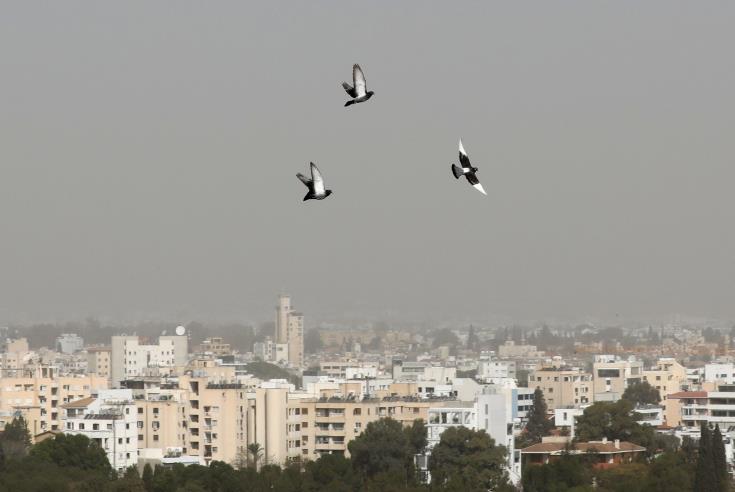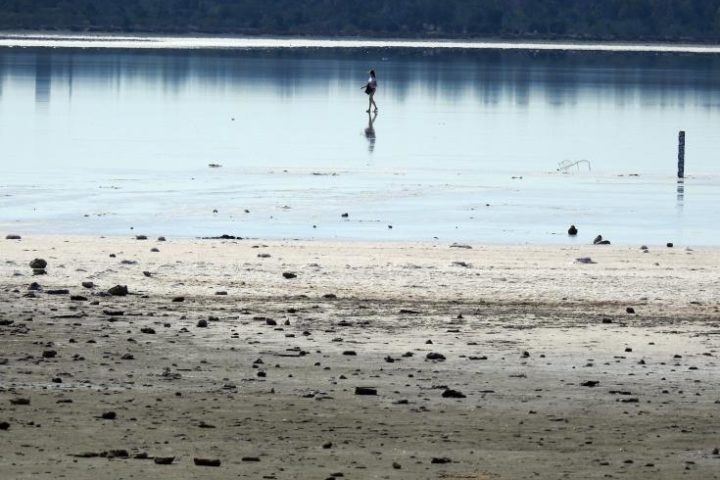Recent dust clouds over Cyprus are a sign of climate change, as the phenomenon is becoming more persistent.
In April alone, Cypriots had to cope with 20 days when dust levels were above the safety levels, accompanied by high temperatures, increasing the feeling of discomfort.
In comments to the Financial Mirror, Michalis Mouskos of the Cyprus Meteorology Service attributed the intensity and frequency of dust storms heading Cyprus’ way to climate change.
“Unfortunately, as a small island nation, there’s not much we can do about the situation but learn to live with the new weather order,” said Mouskos.
The latest dust episode cleared on Friday.
“During April, we recorded dust episodes in the Eastern Mediterranean region for 20 days. Dust from the Sahara Desert had reached Israel, where it was felt more than in Cyprus.”
According to the official records, the dust concentration of PM10 (suspended particles with a diameter of fewer than 10 μm) recorded in Nicosia amounted to 400 μg/m3 and is the highest recorded dust concentration.
The concentration of PM2.5, which is even more harmful to human health, as these particles can penetrate deeper into the lungs, reached 85 μg / m3.
According to the World Health Organisation, daily exposure to PM10 and PM2.5 should not exceed 45 and 15 μg / m3, respectively, as excessive exposure to high concentrations of particulate pollutants is mainly associated with cardiovascular and pulmonary diseases.
As the met officer pointed out, dust, in combination with elevated heat and humidity levels, creates a celestial dome that diffuses sunlight, enhancing the feeling of discomfort.
Mouskos said the dust from recent episodes had made its way to southern Greece, pushing inland on several occasions.
“They are phenomena that we will learn to live with as they are the culmination of both climate change and the disturbances on the surface of the Sahara Desert.”
He said dust episodes are not an uncommon phenomenon, but the intensity and frequency are of concern.
“Such incidents occur mainly in the spring when there is a big difference between temperatures in the warm Sahara and the relatively cooler Mediterranean Sea.
“This difference allows gaseous masses to move more easily from south to north.”
He pointed out that climate change complicates the situation, as the transport of dust depends largely on the prevailing meteorological phenomena.
Middle East
He added there are signs of more intense desertification in the Middle East.
“Although dust episodes from the Middle East are infrequent, there are becoming more frequent and are of particular concern because of the region’s desertification process and armed clashes.
“The island’s atmosphere is currently dust-free, although we could witness more dust episodes in May.
“Models predicting climate and weather conditions in the future show that Cyprus will undergo a process of desertification in the coming decades”.
Experts have warned in the past that the island is forecast to have similar climate conditions to those prevailing today in Egypt’s Cairo.
According to some experts, these changes would see Cyprus’ high-end temperature reaching 50֯ C, 3.5 degrees Celsius above the record 46.6°C recorded a few years ago.
Meanwhile, Jos Lelieveld, a Dutch atmospheric chemist, said in earlier comments to the Financial Mirror that data analysis from Cyprus and the region clearly indicates that extreme weather events are ever-increasing.
Lelieveld, director of the Atmospheric Chemistry Department at the Max Planck Institute for Chemistry in Mainz and professor at the Cyprus Institute, said the Mediterranean is getting warmer, which means more precipitation is expected.
“Model calculations show that extreme weather events are on the cards, which, according to calculations, will continue over the next few decades.”
Lelieveld said that according to measurements, temperatures in Cyprus have gone up by 1֯ C since the beginning of the 21st century and are expected to rise more over the coming decades.
He noted that Cyprus would get warmer, but it is lucky enough to be surrounded by the sea; the cool sea wind will keep temperatures in check.
“In the Middle East, however, we will witness more extreme weather events, with places like Iraq and Kuwait undergoing a desertification process.
“This will affect Cyprus, as sandstorms will carry dust to the island more frequently.”
Lelieveld said that although Cyprus is not in immediate danger of desertification, authorities will have to be on their toes and invest in projects to avoid such a process.










